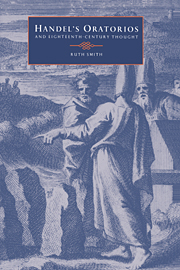Book contents
- Front Matter
- Contents
- Acknowledgements
- Abbreviations
- Introduction
- PART 1 ENGLISH ORIGINS OF ENGLISH ORATORIO
- Chapter 1 Artistic norms
- Chapter 2 The purpose of art
- Chapter 3 Music, morals and religion
- Chapter 4 The biblical sublime
- Chapter 5 The survival of epic
- Chapter 6 The defence of Christianity
- Chapter 7 Towards oratorio
- PART II THE PATRIOT LIBRETTO FROM THE EXCISE BILL TO THE JEW BILL: ISRAELITE ORATORIOS AND ENGLISH POLITICS
- Appendix I Libretto authors and sources
- Appendix 2 The oratorios and Methodism
- Notes
- Bibliography of sources cited
- Index
Chapter 2 - The purpose of art
Published online by Cambridge University Press: 22 September 2009
- Front Matter
- Contents
- Acknowledgements
- Abbreviations
- Introduction
- PART 1 ENGLISH ORIGINS OF ENGLISH ORATORIO
- Chapter 1 Artistic norms
- Chapter 2 The purpose of art
- Chapter 3 Music, morals and religion
- Chapter 4 The biblical sublime
- Chapter 5 The survival of epic
- Chapter 6 The defence of Christianity
- Chapter 7 Towards oratorio
- PART II THE PATRIOT LIBRETTO FROM THE EXCISE BILL TO THE JEW BILL: ISRAELITE ORATORIOS AND ENGLISH POLITICS
- Appendix I Libretto authors and sources
- Appendix 2 The oratorios and Methodism
- Notes
- Bibliography of sources cited
- Index
Summary
THE CONTENT OF ART
One basis of the shocked reaction to the performance of oratorio in the theatre was the widespread view that the theatre was a principal purveyor of vice and encourager of vicious habits. The severest members of the moral majority, for example the Nonjuring clergymen Jeremy Collier and William Law, whose writings on the subject were seriously read and responded to, wanted the playhouses closed. But the belief that public performances were matters of public concern, because they influenced behaviour, was not confined to churchmen; it was universal. Even the popular weeklies agreed that ‘Public Diversions are by no Means Things indifferent; they give a Right or a Wrong Turn to the Minds of the People, and the wisest Governments have always thought them worth their Attention.’ Art affected individual and civic well-being, so it was a matter of national importance. A number of writers, including several friends of Handel and his librettists, and some of the librettists themselves, campaigned for a reform of the stage. Sensitivity about differences of genre co-existed with a very flexible attitude to the uses to which different kinds of art could be put. As Part II of this book shows in more detail, music and drama were arenas for political debate. They had always been vehicles for moral and religious instruction, and some recent commentators have recognised positive campaigns by establishment groups in the seventeenth century and the first half of the eighteenth to exploit them more vigorously to this end.
- Type
- Chapter
- Information
- Handel's Oratorios and Eighteenth-Century Thought , pp. 52 - 80Publisher: Cambridge University PressPrint publication year: 1995



